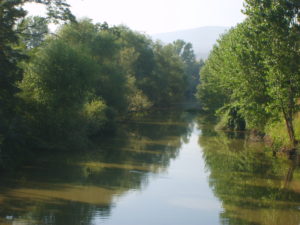Official Acts Upstream
Here's a post from the blog archives of Geekery Today; it was written about 4 years ago, in 2021, on the World Wide Web.
I’ve been reading: “How We Heard The Name,” Alan Dugan (1960).
How We Heard The Name
The river brought down
dead horses, dead men
and military debris,
indicative of war
or official acts upstream,
but it went by, it all
goes by, that is the thing
about the river. Then
a soldier on a log
went by. He seemed drunk
and we asked him Why
had he and this junk
come down to us so
from the past upstream.
Friends,he said,the great
Battle of Granicus
has just been won
by all of the Greeks except
the Lacedaemonians and
myself: this is a joke
between me and a man
named Alexander, whom
all of you ba-bas
will hear of as a god.— Alan Dugan (1960).
From POETRY (February 1960): 270.
I first heard the poem read on POETRY‘s Audio Poem of the Day podcast (23-Sep-2020). The Granicus River (now called the Biga) is a river in northwestern Anatolia, modern-day Turkey, near the ancient site of the city of Troy.
The river banks, and the road crossing the river into the interior of Asia, were the site of the first pitched battle between Alexander’s invading army and the armies of the Shah Darius[1], during Alexander’s conquest of the Achaemenid Persian Empire.[2] Alexander’s army forced the crossing of the river and defeated provincial armies commanded by two Persian satraps — and also nearly two myriads of Greek mercenaries under the command of the Greco-Persian warlord Memnon of Rhodes.[3] According to Arrian, Alexander’s army massacred all but about 2,000 of the Greek soldiers who fought on the side of the Persians;[4] after the battle, the basileus Alexander ordered honorable burials for the Greek soldiers they killed, but he sent the surviving captives into slavery in Macedonia.[5]
Arrian says that basileus Alexander memorialized this victory by stripping 300 suits of armor from dead Persians and sending them to Athens, to hang them up in the temple of Athena in honor of the goddess. He requsted an inscription hang above them, reading: Alexander son of Philip, and (all) the Greeks except for the Lacedemonians, (taken) from the barbaroi colonizing Asia.
[6] Lots of people think that barbaroi
(barbarians, not-Greeks) comes from Greeks imitating meaningless or incomprehensible speech as bar-bar
, much like English blah-blah
.[7] The thing about the Lacedemonians is the basileus’s propagandistic jab at Sparta for refusing to join his Hellenic League or to participate in the invasion of the Persian Empire.
Memnon escaped alive and continued to lead Persian resistance against the invaders until he later died of an illness while fighting in the Ionian islands. As far as I can tell, the poem never says whether the drunk Greek soldier was lost from the Greek army that fought on the side of Alexander’s Hellenic League, or whether he was one of the survivors of the Greek soldiers who fought with Memnon against the invaders.
- [1]Darius III↩
- [2]The battle at the river crossing was the first of three famous pitched battles that form the tentpoles of ancient narratives of the conquest — the (1) Battle of the Granicus, (2) of Issus, and (3) of Gaugamela — respectively, where Alexander’s army first decisively defeated Achaemenid armies and forced the crossing into the Asian interior (1), where Alexander first directly faced and defeated Shah Darius in battle (2), and the final battle before Alexander’s army captured Babylon and forced the effective downfall of the Achaemenid Empire (3).↩
- [3]Memnon came from an ethnically Doric Greek family on the island of Rhodes, just off the coast of Asia Minor. Like many Greeks in and near Asia Minor, Rhodians were politically subjects of the Persian Shah at the time of Alexander’s invasion; Rhodes was invaded and occupied several times between the Greco-Persian Wars and the invasion, but it had been under the control of the Carians, and then directly ruled by the Persians, since Memnon’s adolescence. Memnon married into an aristocratic Persian family; after the Persian satraps were defeated and killed in the battle at the Granicus, Shah Darius appointed him commander over the western satrapies in Asia Minor.↩
- [4]Arrian, Anabasis (
The Invasion
), 1.16.2 (English translation); Arrian adds the gruesome detail that the 2,000 captives were those who lay hidden among the dead bodies.↩ - [5]Arrian, Anabasis, 1.16.6 (English translation),
those Hellenes who, in violation of the things resolved in common by the Hellenic League, fought opposed to Hellas for the sake of the barbaroi.
↩ - [6]Arrian, Anabasis, 1.16.7 (alternate English translation). Greek:
Alexandros Philippou kai hoi Hellēnes plēn Lakedaimoniōn apo tōn barbarōn tōn tēn Asian katoikountōn.
↩ - [7]See for example Wiktionary: βάρβαρος. In classical Greek, barbaroi does not imply the later senses of
barbarian
orbarbarous
as uncivilized, technologically primitive, economically undeveloped, or socially and culturally unsophisticated. The ancient Persian Empire was none of these things and ancient Greeks and Macedonians did not think they were any of these things; if anything, they tended to stereotype imperial Persia as over-civilized, overly rich and overly mannered. Greek and Macedonian men typically denigrated Persian men as luxurious and (therefore, they thought) pampered, weak, or effeminate, — not as bestial, wild, rustic, hardscrabble or simple.↩

Reply to Official Acts Upstream Follow replies to this article · TrackBack URI
Follow replies to this article · TrackBack URI